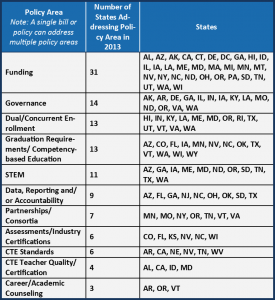 As we have shared previously, last December the Department of Education (ED) concluded a three-part series of negotiated rulemaking sessions regarding the Department’s proposed regulations on “gainful employment.†These proposed rules aim to introduce stricter accountability requirements for vocational programs at for-profit institutions and community colleges across the country in an effort to ensure they are helping their student’s find gainful employment upon graduation. ED assembled a negotiated rulemaking committee, composed of representatives from for-profits institutions, community colleges, and other relevant stakeholders, to establish a consensus on these proposals.
As we have shared previously, last December the Department of Education (ED) concluded a three-part series of negotiated rulemaking sessions regarding the Department’s proposed regulations on “gainful employment.†These proposed rules aim to introduce stricter accountability requirements for vocational programs at for-profit institutions and community colleges across the country in an effort to ensure they are helping their student’s find gainful employment upon graduation. ED assembled a negotiated rulemaking committee, composed of representatives from for-profits institutions, community colleges, and other relevant stakeholders, to establish a consensus on these proposals.
Unfortunately, the committee failed to come to such a consensus on ED’s draft regulations during the last of the negotiated rulemaking sessions this past December. Per the Department’s policies, a lack of consensus among the rulemaking committee allows ED to introduce new regulations on its own. Today, ED released these new regulations and will soon open them up for public comment over the next two months.
The regulations—over eight hundred pages in length— introduce stricter standards for the amount of debt students can accrue while attending institutions offering career-training programs. There are three main criteria a program must pass in order to maintain eligibility to receive federal financial aid under Title IV of the Higher Education Act. The first two are related to loan payments. Programs which have student loan payments higher than 30 percent of discretionary income or 12 percent of total income would fail under the new rules if those ratios persisted for any two out of three consecutive years. The third criterion is tied to a program’s cohort default rate (pCDR) for both completers and non-completers. If a program’s pCDR exceeds 30 percent for three consecutive years, the program is deemed failing.
Another important feature of these new regulations affords programs the ability to appeal for those that have less than half of their completers take on debt. This is an important change from ED’s last draft proposal in December and will benefit programs at Community Colleges and elsewhere which typically offer two-year programs at a relatively lower cost to students.
Barring any major revisions between now and October 30th of this year, these regulations are set to go into full-effect in 2016. As with previous iterations of ED’s gainful employment regulations, these new rules will likely be challenged in court. As this process unfolds, please check our blog for updates on how these regulations will likely impact those in the Career Technical Education community.
ED’s full gainful employment regulations can be found here and additional information on the process can be found here.
House Subcommittee Passes the FIRST Act
Yesterday, the House Committee on Science, Space and Technology’s Subcommittee on Research and Technology passed the Frontiers in Innovation, Research, Science and Technology (FIRST) Act (H.R. 4186). The bill would reauthorize the America Competes Act of 2010 and has now moved on to the full committee for consideration.
While some Democrats on the Subcommittee voiced concerns over reduced levels of funding for the National Science Foundation (NSF) and the National Institute of Standards and Technology (NIST), Republicans highlighted the bill’s focus on better coordination of existing federal Science, Technology, Engineering and Mathematics (STEM) initiatives. Among other provisions, the FIRST Act would create a STEM Education Coordinating Office to better manage STEM education activities and programs at the federal level and would be overseen by NSF.
Notably, the legislation would broaden the definition of STEM to include not only the core components laid out in its acronym, but also “other academic subjects that build on these disciplines such as computer science and other academic subjects that a State identifies as important to the workforce of the State.â€
NASDCTEc will continue to monitor this legislation as it moves to the full Committee. The full bill can be found here and a statement from the Committee Chairman Lamar Smith (R-TX) can be found here.
JOBS Tax Credit Act Introduced in the House
This past Tuesday, Representative Maffei introduced the Job and Opportunity Bonus (JOB) Tax Credit Act which seeks to address the nation’s persistent skills gap by creating a temporary tax credit for employers to help pay for the cost of training their employees.
According to the Congressman, “So many of our local businesses want to invest in training for current and new employees, but don’t have the resources to do it. My bill helps address this issue by providing a tax credit for worker training programs.â€
Among the provisions contained in the bill, the JOBS Tax Credit Act would pay for 50 percent of the cost to train employees in an approved program which would include apprenticeship programs, training offered by vocation or technical schools or community colleges, and a variety of industry or labor union-sponsored training programs. The tax credit would only be able to be utilized by employers with 500 employees or less and would last between 2015 to 2017.
NASDCTEc applauds Rep. Maffei’s work to better address the nation’s skills gap and urges Congress to take up this important piece of legislation.  His office’s full press release on the JOB Tax Credit Act can be found here.
Steve Voytek, Government Relations AssociateÂ
 has not only weathered the storm of tight budgets and shifting education policy, it has thrived in most states.
has not only weathered the storm of tight budgets and shifting education policy, it has thrived in most states.



 This blog series provides readers with insight on the valuable content that is being shared at the NASDCTEc Spring Meeting. Guest bloggers are partner organizations, supporters and other experts that will be present at the national gathering in the Washington, DC area.
This blog series provides readers with insight on the valuable content that is being shared at the NASDCTEc Spring Meeting. Guest bloggers are partner organizations, supporters and other experts that will be present at the national gathering in the Washington, DC area.

